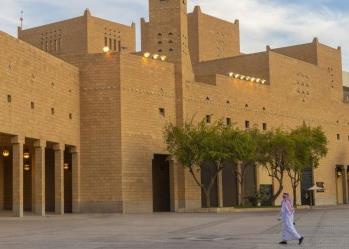
Libya’s deputy premier discusses the challenges facing the interim government, engaging with civil society and encouraging international companies to return to the country
Construction echoes through the modest office of Awad Ibrahim Elbarasi in the smart Tripoli neighbourhood of Ben Ashour. The building is abuzz with activity; labourers from the Indian subcontinent work on its renovation. Its previous occupants were officers of the Mukhabarat el-Jamahiriya, Muammar Gaddafi’s secret police, before it was converted to house the executive office after the regime was toppled.
For now, Libya’s new deputy prime minister’s office is sparsely furnished, save for a red, black and green flag in a corner. It is not what you expect from a ministerial office in one of the largest oil exporters in the region, but the setting reflects the country’s changes since the ousting of Gaddafi.
The National Transitional Council (NTC) that governed Libya after the fall of the regime was officially dissolved in August last year, handing power over to a new 200-member parliament, the General National Congress (GNC), another interim body tasked with drafting a new constitution.
Unlikely candidate
When protests erupted in Tripoli on 17 February 2011, Elbarasi was working in the UAE as vice-president for Dubai Electricity & Water Authority (Dewa). He returned to Libya and was appointed electricity minister under the NTC and Prime Minister Abdel Rahim el-Keib in 2011. Following the GNC elections in June 2012, Elbarasi was one of three candidates for the premiership, running against Mustafa Abu Shagour and Mahmoud Jibril. He jokes that he was an unlikely candidate and gained only 41 votes.
As a government, we are trying to do our part, trying to be transparent with the people
Nonetheless, Elbarasi has proved his staying power. He remains the only minister in the Libya cabinet to have survived its three interim governments. While Abu Shagour won the congressional vote to lead the GNC as prime minister, his premiership was torpedoed by a vote of no confidence in October after he failed to gain enough support to form a government. By September, Abu Shagour was forced to resign and was replaced by Ali Zeidan.
“This is my third government,” says Elbarasi. Given his successes in the electricity sector, it is unlikely to be his last.
The timetable for Libya’s planned polls is complicated. Elbarasi hopes to see a new round of parliamentary elections by the middle of next year. But before that can happen, the GNC must form a committee of 60 members to write a constitution, which will be voted on in a country-wide referendum.
How the GNC will draw up its draft constitution will be a key test of how the body plans to pass laws under its short reign in Tripoli.
Election schedule
“It will take six months to form a committee of 60, so by September they will have had the elections and formed the committee. Then it will take a couple of months to write the constitution, then there will be another vote. Then, we will have free elections,” says Elbarasi.
He is confident in the timeline, but there is potential for further delays. To address concerns that the 60-member constitutional committee would not be representative of the entire country, the GNC will elect the members from its congress, although it remains unclear how the body will be made up. The idea of 20 members from each of Libya’s three regions, Cyrenaica, Tripolitania and Fezzan has been mooted, but remains unsettled.
Banned by King Idris in 1952 and called a cancer by Gaddafi, political parties are a novelty in Libya. Elbarasi’s own Justice & Development party was only formed a year ago. It is an Islamist organised entity like its Muslim Brotherhood counterpart, the Freedom & Justice party in Egypt. It is led by Mohammed Sawan, a former political prisoner from Misrata.
The Justice & Development party and Elbarasi believe Libya’s future is under a parliamentary system. It supports decentralisation, but is opposed to any calls for a federalist state. This will be up for debate by the constitutional committee elected this year to write Libya’s new constitution.
“After constitutional elections, we will see what kind of system we have. Are we going to go with provinces, with three regions or federalism? I think we are going for provinces. This is my sense,” he says.
Expectations are running high among Libyans after successfully bringing down Gaddafi’s regime, and their recognition that the country has, so far, not lived up to its enormous potential since then.
The approval of a new budget should allow some of Libya’s stalled projects to move ahead and give a sense of assurance that progress is being made. In January, the government submitted a LD66bn ($51.6) budget for 2013, LD2bn lower than the record-breaking LD68bn budget passed in 2012. But getting GNC approval has taken time.
“We submitted the budget to the national congress at the end of January. They said they needed a month, so it was extended,” he says.
“Companies are returning, but not as many as we expected. Once they approve the budget, then we can move forward. At the moment, whatever we are spending is … the budget from last year, just to run the government. Hopefully, in March we will have the budget and we can restart some of the stopped projects.”
As MEED went to press, the Libyan parliament passed the budget.
Contract reviews
The GNC is reviewing more than 12,000 contracts, worth an estimated $140bn, that were awarded under the former regime. With payments on the contracts in arrears, many international companies are unwilling to return to Libya until their status is finalised, but their participation in the economy is essential to get the country back on its feet. The government has agreed to pay companies willing to resume operations 50 per cent of their dues before they start work, and the remainder in two subsequent payments.
“We have commitments to make payments to some contractors. This is good for our country. If we can restart the projects, people will see cranes and see that the country is moving forwards and we are returning to normal life. People who are still carrying weapons will see right away that there are job opportunities so they will give them up. It is all related,” says Elbarasi.
The most urgent concern for the interim government is the provision of basic services. The government’s priority is clear with water, power and roads given an allocation of 60 per cent of capital expenditure in the 2013 budget. Housing, healthcare and education come next.
In the decade up to 2010, power demand growth averaged 8-10 per cent a year, peaking at 5,759MW, driven by population growth and an economy just beginning to open up to investment. Installed capacity totalled 8,349MW in 2010. Of this, half was gas turbine technology, almost 30 per cent was combined-cycle technology, with the remainder comprising steam technology.
The Gaddafi regime forecast power demand would reach 12,600MW in 2015 and 15,000MW by 2020. More than 6,000MW of new capacity was planned or under construction, but delays were frequent. The outbreak of civil war brought all these projects to a halt. Eighteen months later, two problems remain for the power sector. Foreign companies are still negotiating their return to Libya. At the same time, protests at refineries have led to disruptions in gas feedstock and fuel oil supplies, hitting the national grid.
Elbarasi has put his experience at Dewa to good use. In the first post-Gaddafi winter, most Libyans received less than three hours of electricity a day. “This winter, our overhauling work meant we didn’t have this problem,” he says.
But power shortages are almost certain this summer. “This is why we are going in two directions. The first is fast-tracking simple-cycle power projects, the kind used in Kuwait and Dubai in the past. We are also going for rented mobile turbines with companies such as [the US’] GE. We want to encourage the private sector to participate in Libya, so we are also looking at models for independent power projects,” he says.
In December, France’s Alstom was awarded a $320m contract by state-owned General Electricity Company of Libya (Gecol) to supply spare parts for 11 gas turbine units at five power plants in Tripoli, Benghazi, Khoms, Zawiya and Zuetina.
The second anniversary of Libya’s liberation passed on 17 February with none of the protests and clashes seen in Cairo and Tunis. But at the time of interview, a group of 30 wounded civil war veterans were still occupying Libya’s temporary parliament building in Tripoli. They posed a rather unique dilemma to the government and the GNC. The protesters were certainly disrupting the functioning of the body, but the government was unwilling to remove the heroes of Libya’s uprising by force. Many people are sympathetic with the frustration felt by the group. Others believe there is a sense that the veterans have been used by other forces to manipulate the government, although it is unclear to what end.
Challenges ahead
Nevertheless, the protest sums up the challenge faced by the GNC whose mandate is simply to keep the country functioning while it draws up a constitution before passing on the baton to another elected government.
There has been plenty of criticism of Libya’s chief of staff Yusuf al-Mangoosh over his inability to rebuild the country’s armed forces more than 18 months after revolution. He may soon be replaced.
“Things are improving slowly, but they are improving. It is still a transitional period. If you look at our neighbours, Tunisia and Egypt, you will see Libya is doing quite well. But it is not a complete comparison. They removed their presidents, but still had institutions, the government, the army, the police. In Libya, nothing. We are starting from scratch,” says Elbarasi.
“You can see the youth, the women, civil society all participating in explaining to the people about their rights. Watch the TV, you will hear so many voices. It has never been like that. You could not even mention the names of football players or singers, just one name was mentioned on TV: his name. The role of civil society is critical. As a government, we are trying to do our part, trying to be transparent with the people.”
“It will take time, but things are getting better,” says Elbarasi.
Awad Elbarasi will be giving a keynote address at the Libya Projects 2013 Conference to be held on 3-5 June at the Corinthia Hotel, Tripoli, Libya. For further information contact +971 439 00699 or visit www.meedlibyaprojects.com
Career history
1995 Master of science degree in electrical and computer engineering, University of Waterloo, Canada
2000 Doctorate in electrical and computer engineering, University of British Columbia, Canada
2000-02 Consultant at Power Technologies Incorporated in Denver, US
2002-11 Vice-president of planning, Dubai Electricity & Water Authority (Dewa), UAE
2011 Electricity & Renewable Energy Minister, Libya executive office
2012 Electricity & Renewable Energy Minister, National Transitional Council
October 2012 Deputy prime minister, interim government of Libya
You might also like...

Abu Dhabi makes major construction investments
25 April 2024

Saudi Arabia seeks K9 PPP project interest
25 April 2024

Kuwait reviews 1.1GW solar prequalifications
25 April 2024

LIVE WEBINAR: Abu Dhabi Oil & Gas 2024
25 April 2024
A MEED Subscription...
Subscribe or upgrade your current MEED.com package to support your strategic planning with the MENA region’s best source of business information. Proceed to our online shop below to find out more about the features in each package.








